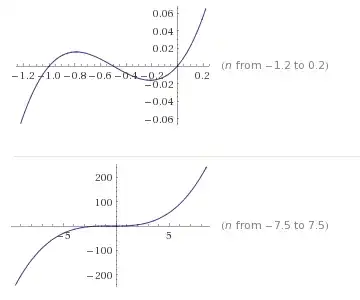No, simply saying that this is a continuous function does not work as an induction step.
The function $f(n) = n$ is continuous, but it is certainly not true that
$$\sum\limits_{i = 1}^n i^2 = n.$$
Edit: To actually do the induction, (I'm assuming that you have already established a base case):
First, assume that the result ($\sum\limits_{i = 1}^n i^2 = \frac{n(n + 1)(2n + 1)}{6}$) holds for some $k$.
Then, this gives that
$$\sum\limits_{i = 1}^k i^2 = \frac{k(k + 1)(2k + 1)}{6},$$ so
$$\sum\limits_{i = 1}^{k + 1} i^2 = \frac{k(k + 1)(2k + 1)}{6} + (k + 1)^2.$$
Now, multiplying out the numerator of this fraction and rewriting $(k + 1)^2$ as $\frac{6(k+1)^2}{6}$ gives that
$$\sum\limits_{i = 1}^{k + 1} i^2 = \frac{2k^3 + 2k^2 + k^2 + k + 6(k^2 + 2k + 1)}{6} = \frac{2k^3 + 9k^2 + 13k + 6}{6}.$$
Finally, factoring this cubic gives that
$$\sum\limits_{i = 1}^{k + 1} i^2 = \frac{(k + 1)(k + 2)(2k + 3)}{6} = \frac{[k + 1]([k + 1] + 1)(2[k + 1] + 1)}{6}.$$
Thus, since the result holds for $n = 1$, and since if the result holds for some $n = k$, then it also holds for $n = k + 1$, by the principle of mathematical induction, the result holds for all $n \in \mathbb{N} \setminus \{0\}$ (Or $\mathbb{N}$ if zero isn't a natural number for you.)
Edit again: Also, this works with the lower bounds changed to zero, which might be a bit neater as a result.
